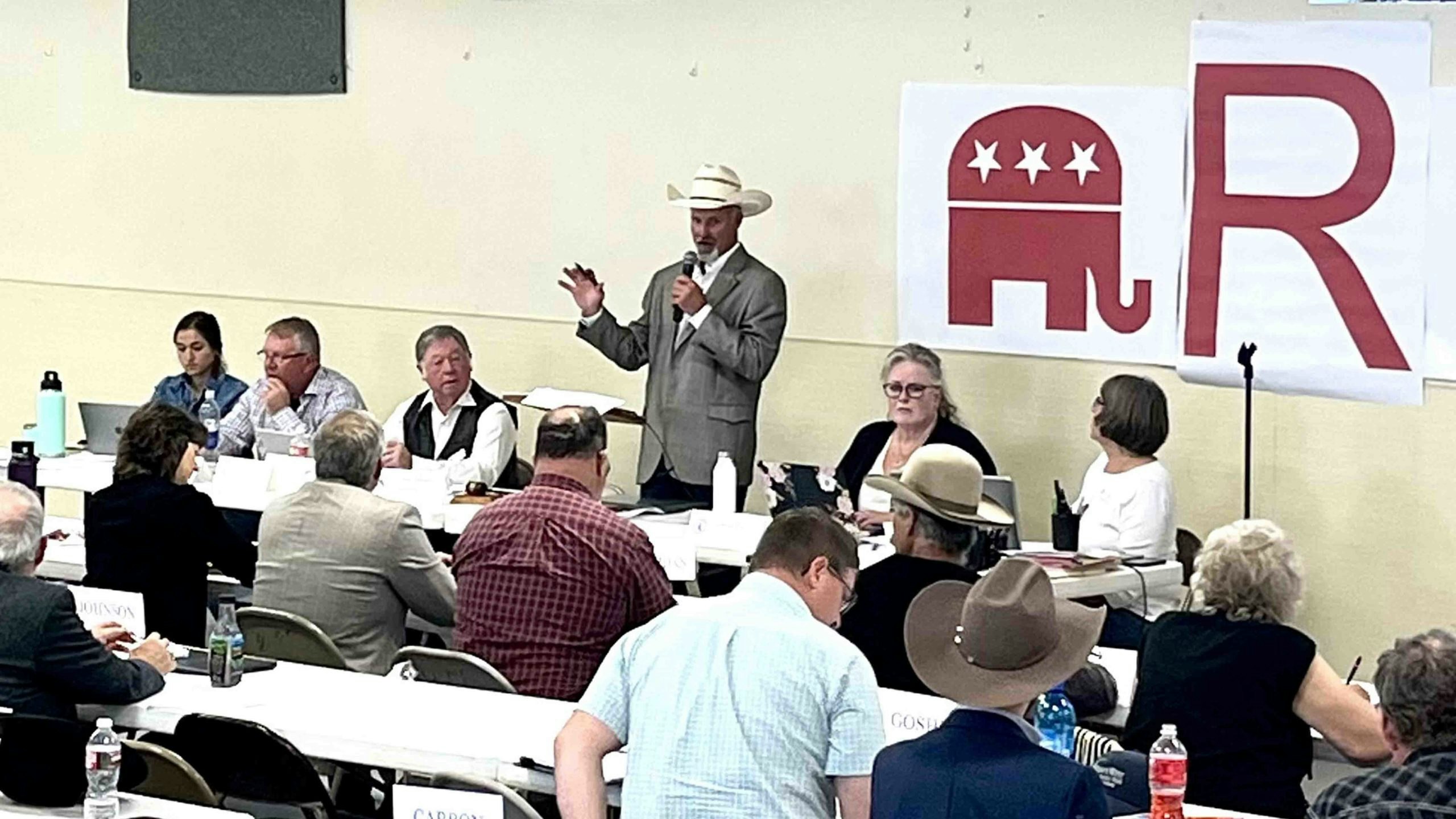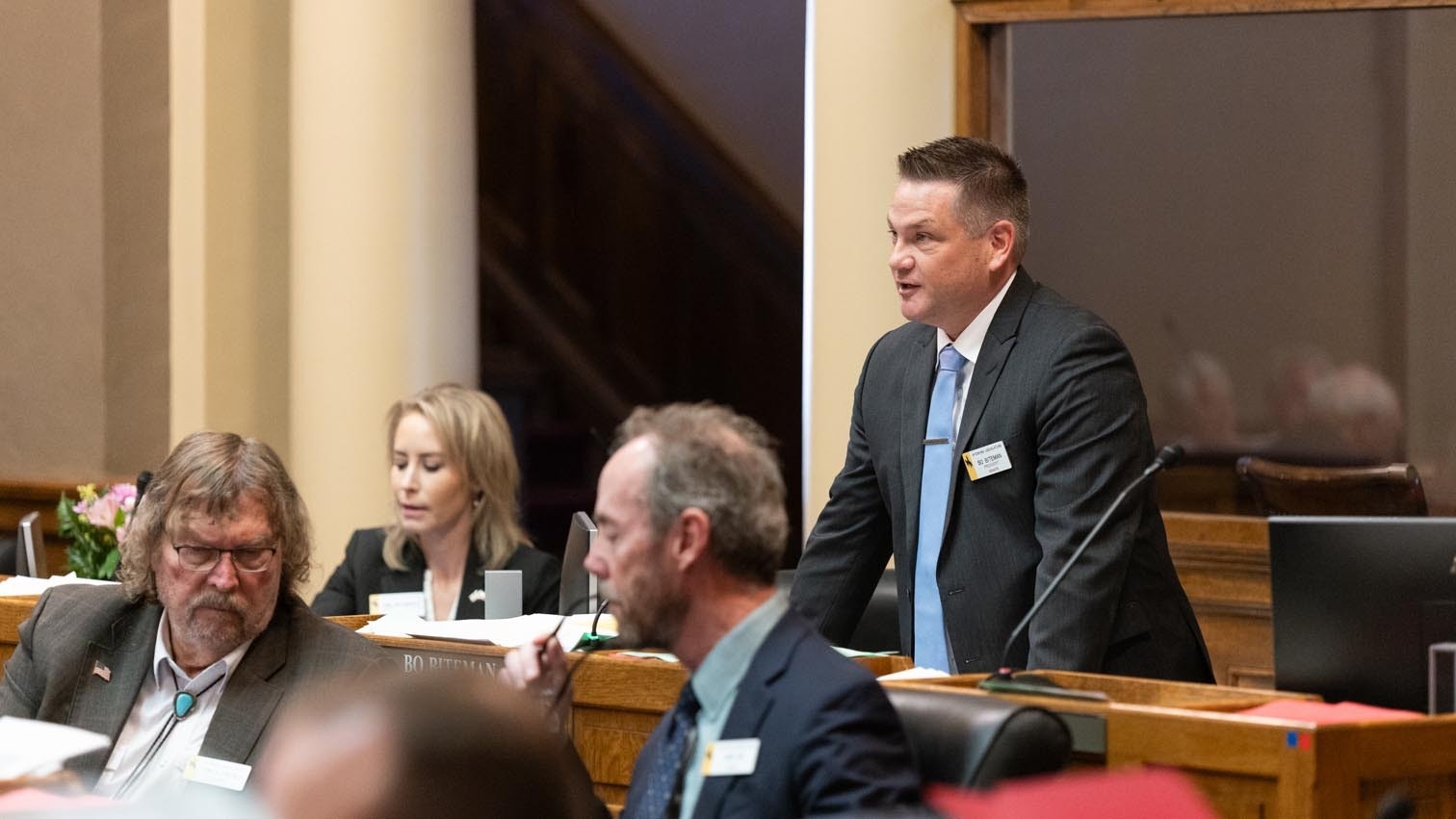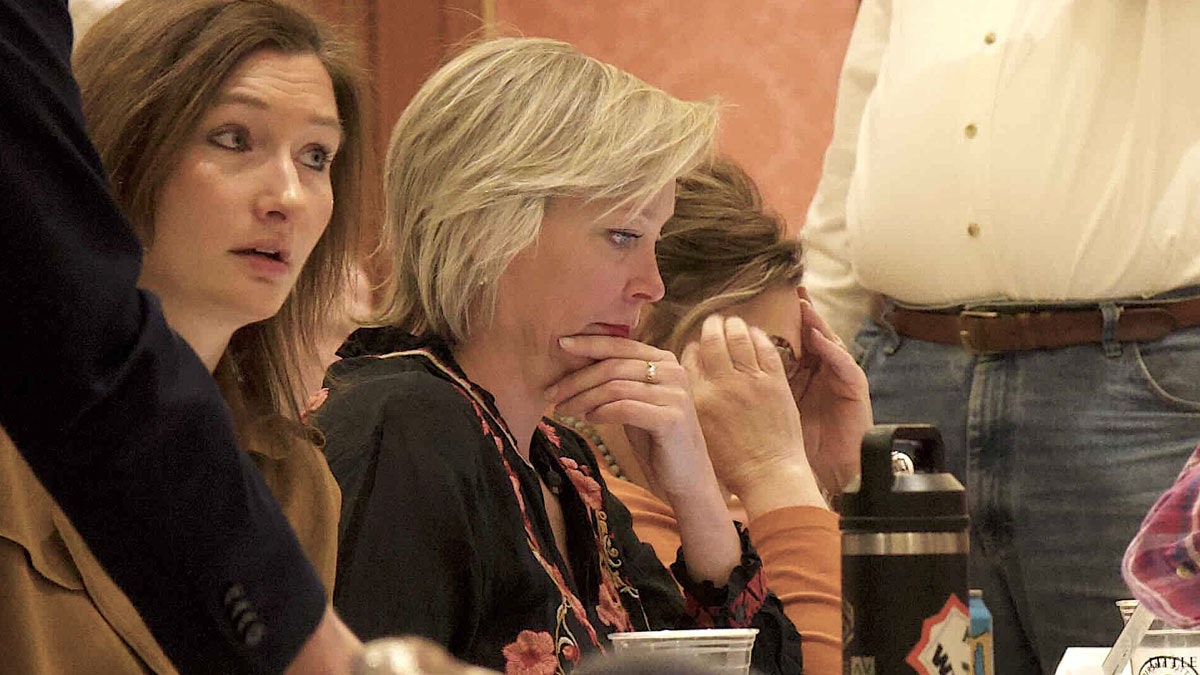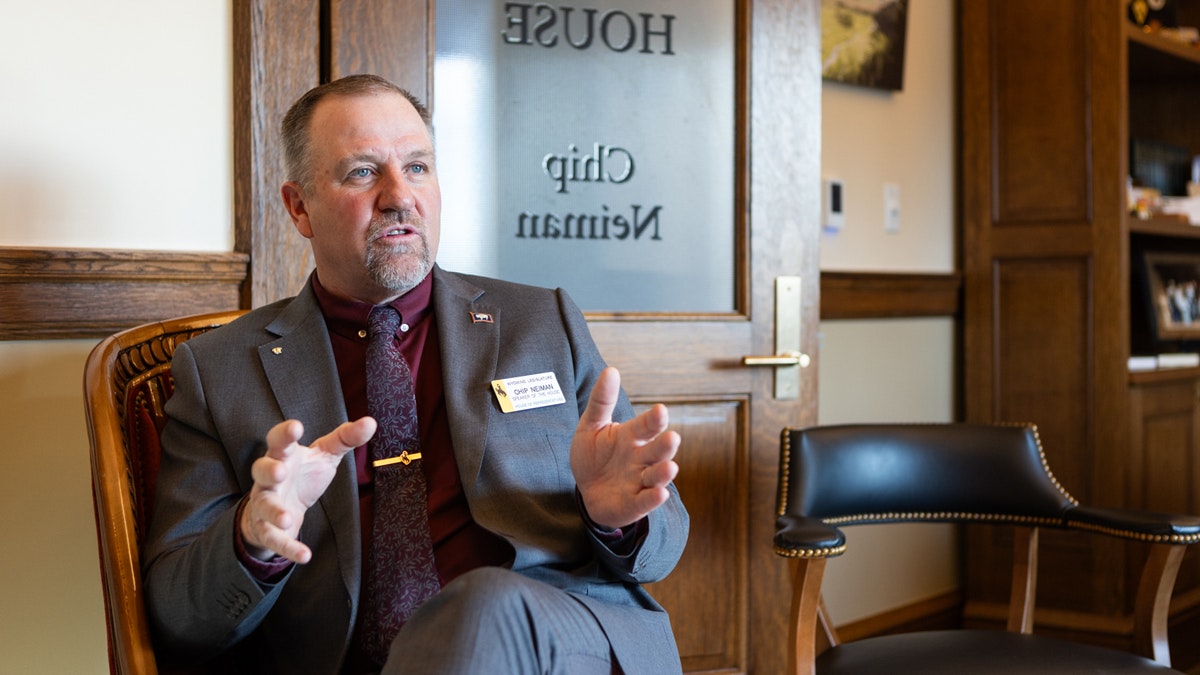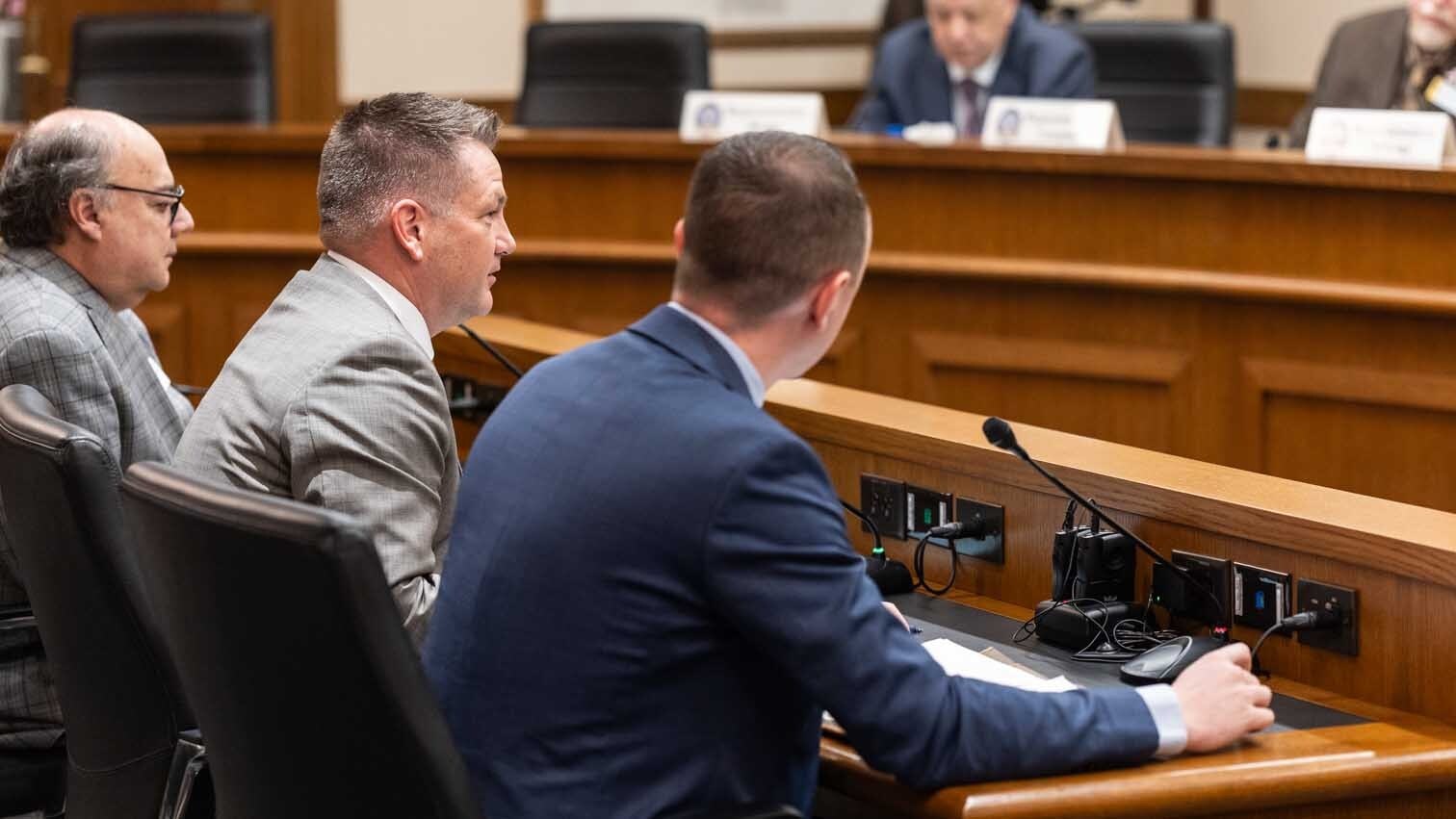By Leo Wolfson, State Political Reporter
Leo@Cowboystatedaily.com
PAVILLION — The Wyoming Republican Party’s process used to select an interim secretary of state Saturday was in many ways a test of allegiance to GOP secretary of state nominee state Rep. Chuck Gray, R-Casper. The three finalists chosen by the party each emphasized their support for Gray.
“The biggest thing in this interim position is to make sure the election is done and the smoothest transition for Chuck Gray,” said candidate Karl Allred, one of the chosen three finalists. “There could be a lot of land mines thrown. … The biggest thing is to ensure a clean transition until Chuck Gray is in office.”
Allred, Marti Halverson and Bryan Miller were selected as finalists for the interim secretary of state position during Saturday’s Republican Central Committee meeting in Pavillion. Gov. Mark Gordon will have five days to select an interim secretary of state from the three finalists.
Halverson had the most votes with 55. Miller was second with 52 and Allred third with 43 votes.
“I am thrilled that my central committee has given me their vote of confidence today,” Halverson told Cowboy State Daily.
Of the 72 voting members, 19 participated virtually.
Miller, Sheridan County GOP chairman, said he has “a ton of experience to do something like this.”
The Sheridan resident has been involved with the county party since 2015 and ran against Gray when they both unsuccessfully pursued the GOP nod for Wyoming’s U.S. House seat. Miller also ran for U.S. Senate in 2014.
Miller lost both his state House and party precinct races this year. A recent change made to state party bylaws will still allow him to run for another term as chairman next spring.
“Someone needs to go down to Cheyenne to ensure the integrity of the general election is upheld,” he said.
Allred, a Uinta County Republican Party committeeman, is the longest continuously serving GOP Central Committee member. If chosen by Gordon, he said the office will pass over “flawlessly” to the permanent secretary of state, who takes office in January.
“This is not a job, this is an interim placeholder,” Allred said.
In an interview after being chosen as a finalist, Allred gave more importance to the position, saying the appointed candidate will be in charge of overseeing the Secretary of State’s office.
Miller agreed with the placeholder synopsis.
“No matter how you slice it, of course it is. It’s three months.” he said
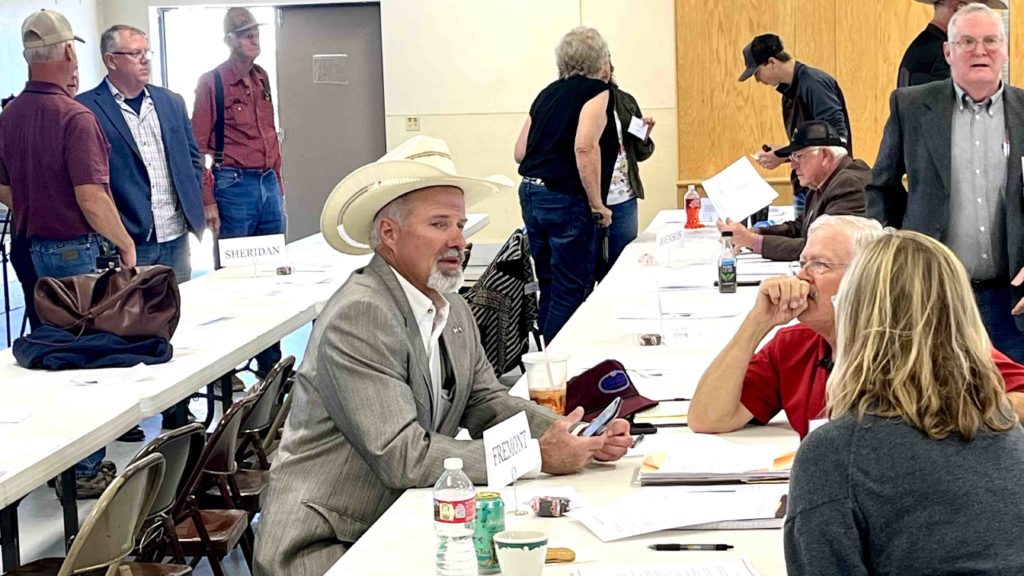

Elections Oversight
Marti Halverson and Allred placed specific focus on facilitating a smooth transition to the next secretary of state, largely expected to be Gray, who does not have an opponent in the general election.
Halverson, a former state legislator and president of Right To Life of Wyoming, said she will “do whatever Chuck needs me to do.”
Mark Armstrong, an Albany County Republican Party committeeman, finished third in the Republican primary for secretary of state with more than 14,000 votes. On Saturday, he received three.
During his speech, Armstrong said he would “take some of the heat” for issues Gray wants to get done, such as banning voting drop boxes. The commitment to ban theboxes was a major campaign promise of Gray’s. Allred also said all ballot drop boxes need to be eliminated, but did not say whether he would try to enact this before Gray gets to office.
Allread also mentioned a need to further strengthen the state’s voter ID laws. Gray helped pass a voter ID law in 2021. Halverson mentioned how an ID is not required to acquire an absentee ballot.
Mary Lankford, who finished in fifth with 13 votes, was Sublette County clerk for 32 years and the only candidate who has worked directly in elections. One of the chief duties of the secretary of state is to oversee the state’s elections.
Lankford also mentioned the Secretary of State’s office performed a clean audit report of the primary election.
“Wyoming’s elections have integrity. (I would be) just continuing the good work they’re doing by overseeing the process,”she said.
Lankford said she is “obligated” to vote for Gray in the general election and would wait to speak to him about a transition plan, but not until after the general election. Miller said he would not wait until after the general election to speak with Gray despite him being an active candidate for the job. Allred acknowledged this possible conflict, but was vague when asked whether it would stop him from communicating with Gray.
“I talk to everybody,” he said.


‘A Horrible Precedent’
Armstrong described attempts by certain members of the Corporations, Elections and Political Subdivisions Committee to weaken the secretary of state’s duties and create a nonpartisan voting commission as “abhorrent.” Miller said these efforts “set a horrible precedent.”
Halverson spearheaded a recent campaign through her own Election Integrity and Security Committee to audit elections from several precincts in Laramie and Fremont counties. The committee prepared a long report that was shared with former Secretary of State Ed Buchanan, citing a number of shortcomings it believes exist in Wyoming’s elections.
Halverson also said electronic poll books have caused significant problems and is something she wants to address.
“Everything I do in the next three months would be with one goal: facilitating a smooth transition for the next secretary of state,” she said.
Halverson was chosen as a finalist for interim superintendent of public instruction in January, but not selected by Governor Gordon.
Miller and Armstrong also took time to talk about what they believe are problems with the integrity of elections in their respective counties. Miller claimed a number of election code infractions have happened in Sheridan, drawing concern from him and others.
“They were allowing certain things to happen that started small,” he said. “The broken window was there. If you don’t fix the window, the more people will take advantage.”
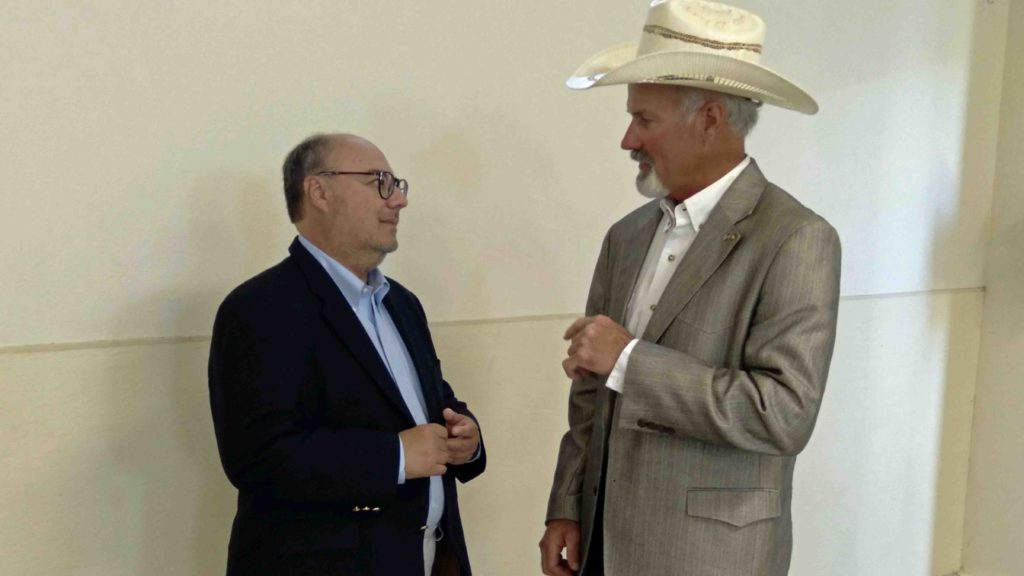

“Disappointed”
“Rep. Dan Zwonitzer, R-Cheyenne, who is chair of the Corporations, Elections and Political Subdivisions committee, said he was disappointed with the selections the party made on Saturday.
“I want the party to select people I think are more mainstream,” Zwonitzer told Cowboy State Daily Saturday night. “I want the party to nominate people who have experience in the office they’re seeking instead of party insiders.”
Board Duties
The secretary of state has a number of other duties aside from overseeing Wyoming elections, such as serving on critical state-level boards and managing business registrations in the state.
As a member of the Wyoming Attorney General’s office, candidate Patrick Miller already works directly with the State Lands and Investments, State Building Commission and State Board of Land Commissioners. The secretary of state is a member of all three boards.
“I would just encourage you to really be thoughtful about the candidate that is selected,” he said, stressing a commitment to careful decision making.
He finished in sixth with a total of eight votes.
Allred said he would make sure taxpayer dollars spent by SLIB are closely monitored. Bryan Miller said most projects should be funded by the counties and municipalities and said he does not believe SLIB will have any more significant meetings the rest of the year.
Halverson said she would decide whether she would vote for state-funded roads projects based on whether the government has the authority to facilitate the proposed work.
Armstrong said he would support returning federally-granted funds as a member of this board. He used the topic as a tangent to talk about his claim that he was unjustly fired from his job as a geologist and how his divorce was impacted by the federal government.
Bob Ferguson, treasurer for the Wyoming Republican Party, said he would use his power on this board to preserve mineral and natural resources. Ferguson finished in fourth with 24 votes.
He mentioned his experience working on Wall Street and for the National Rifle Association when discussing the three boards the secretary of state sits on.
“Fortunately, my financial experience lets me be in a good position to be able to step onto those boards and effectively,” Ferguson said via telephone.
Bryan Miller and candidate John Holtz, who received one vote, both have military backgrounds.
Holtz is a Laramie attorney who served as a Converse County judge from 1981-93 and a deputy county attorney for Converse County from 1979-81. He spoke about how his experience working in the Air Force and ballistic missiles give him solid preparation for the secretary of state job.
“You have to be on your toes,” he said.
Procedure
Many committee members like Ferguson were not able to attend the meeting in person because of a road closure in the Wind River Canyon. Because of the delay and other technical difficulties, the party did not start discussing agenda items until 90 minutes after the scheduled start, and certain members from Park County and Hot Springs counties participated virtually.
Candidates Pete Illoway and Janet Marscner were not present at the meeting and no information about them was shared Saturday. They received a combined four votes.
There were 10 total candidates who ran for interim secretary of state. Jennifer James rescinded her application Friday night shortly after the slate of candidates was announced. Four candidates were able to cast a vote in the selection process as sitting committee members. No mention was made of excusing these candidates from their voting powers.
Allred also was allowed to explain the rules of the race he was simultaneously participating in.
A motion was rejected early on to eliminate Patrick Miller from candidate consideration because he did not provide his address or phone number in his original application packet. He did provide the information and his driver license in-person Saturday.
Miller, a 25-year old Cheyenne resident, has a job that is sensitive in nature and said he was nervous about his personal information becoming public.
“Don’t disqualify him, show him the amount of consideration he showed us,” said Carbon County Committeeman Joey Correnti.
Big Horn County GOP Chairman Gary Welch argued against allowing Miller to participate, saying his personal information would inevitably become public due to the public nature of the Secretary of State position.
All the candidates were removed from the room while their opponents spoke. They were allowed to stay in the room after they were done speaking for the day.
Under the voting rules, candidates were eliminated who did not receive a majority of votes, a runoff format. Since only three candidates received a majority of the vote after the first round, no further votes were taken.

